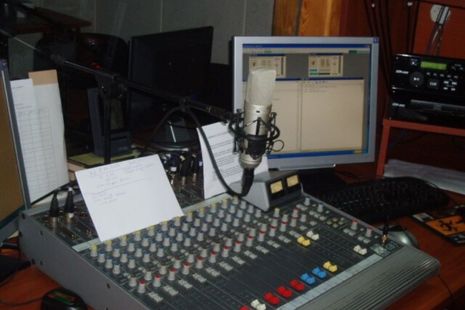Gaining the most by being a (radio) host
Emma Gower reflects on her experience in student radio

‘You’ve got a face for radio’ is possibly one of the worst things anyone could hear. But ‘you’ve got a voice for radio’ is quite different, and something I never considered until a few months ago. Growing up, I always enjoyed reading aloud in class or speaking in assemblies, and for years I’ve been an avid podcast listener, so presenting a radio show might seem like a natural progression for me. But it wasn’t something I realised I could put into practice until recently.
In Easter Term of my first year, I found myself deeply frustrated by my lack of extra-curricular activities. Exam term meant endless days glued to library chairs; everything seemed to come to a grinding yet necessary halt. But I found myself at a loose end creatively. I needed something else to do. Something to engage in that I could pick up easily in the final term of the year. Some way to exercise my creativity without disrupting others from studying. So, when a friend mentioned how she recently became involved with student radio, inspiration struck. Fast forward two weeks of training, and I found myself setting up the studio before my show for the very first time.
Here at Cambridge, where we have such a vibrant performing arts scene, I wish radio was less tucked away. Performing to people you can’t see is still performing! Student radio is unique in so many other ways, too. It models almost exactly how you would operate in a professional version of the same environment, from show planning to desk operating. But perhaps its most significant quirk is that it is one of the only extra-curricular activities that you do entirely by yourself. I was sceptical of this fact at first – visions of me spilling drinks over the radio desk while live on air came hurtling into view – but it turned out to be a blessing.
“When a friend mentioned how she recently became involved with student radio, inspiration struck”
Suddenly, I had an uninterrupted hour every week to share my passions with others and talk about anything I wanted (although many who know me might suggest I did this well before my radio days). Choosing the topic of my show came surprisingly easily to me. As an English student whose Spotify is always playing, a show where I matched literary characters to songs seemed almost preordained. Thus, ‘Once Upon A Tune’ was born.
Despite being alone in the studio each week, getting involved with radio has brought me even closer to my loved ones. Many family dinners are now spent debating which characters I should discuss next, and receiving a message from a friend to tell me they discovered a new song through my show never fails to leave me glowing.
“Despite being alone in the studio each week, getting involved with radio has brought me even closer to my loved ones”
It seems that this newfound love for radio is not unique to me – according to Radiocentre, more people in the UK were listening to the radio in 2024 than ever before. To me, this is a testament to the importance of audio entertainment. With busy day-to-day lives, sitting down to watch television or read a book is a rarity for most. Radio shows and podcasts, however, are accessible wherever and whenever. They provide a strange yet welcome sort of company not just for listeners, but presenters as well: I love knowing that what I’m saying in the studio is making a difference to somebody listening, even if it simply brings a smile to their face.
So, the next time you are muttering to yourself about being bored, why not mutter in front of a microphone instead? At least then talking to yourself is a sign of creativity rather than madness.
 News / Judge Business School advisor resigns over Epstein and Andrew links18 February 2026
News / Judge Business School advisor resigns over Epstein and Andrew links18 February 2026 News / Hundreds of Cambridge academics demand vote on fate of vet course20 February 2026
News / Hundreds of Cambridge academics demand vote on fate of vet course20 February 2026 News / Petition demands University reverse decision on vegan menu20 February 2026
News / Petition demands University reverse decision on vegan menu20 February 2026 News / CUCA members attend Reform rally in London20 February 2026
News / CUCA members attend Reform rally in London20 February 2026 News / Caius students fail to pass Pride flag proposal20 February 2026
News / Caius students fail to pass Pride flag proposal20 February 2026










